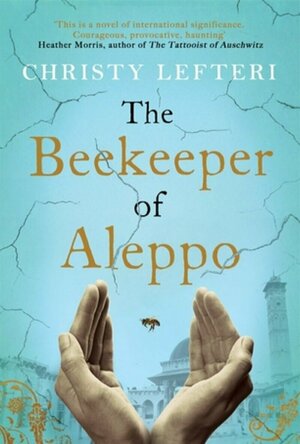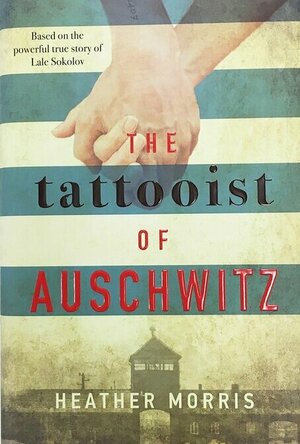Search

The Beekeeper of Aleppo
Book
'This is a novel of international significance. Courageous, provocative, haunting, it will open our...
War Syria Refugees
Amanda (96 KP) rated The Tattooist of Auschwitz in Books
May 29, 2019
“If you wake up in the morning, it is a good day.”
So I thought about it, and I’ve decided to write my review for this book. I’ve never read books that center around The Holocaust. I never thought I would, because I’ve seen several movies and just the sheer graphics of it alone made me sad. I know this was supposed to be based on a true story, but I went into it with the mindset that it wasn’t true, because most times, some of those stories are fabricated for drama purposes. I’ve read that even Heather Morris added some things to the story for that reason, so again, I saw it as just another story.
The story centers around Lale who is transferred to Auschwitz, but is given the job as a tattooist. From the descriptions, he has to use a really awful needle and has to press down hard enough for the numbers to be seen and never removed – a highly painful process that he has to perform even on children. Then one day, he tattoos a lady that catches his eye, Gita, and from then on he plans to love her and marry her WHEN they get out of Auschwitz.
Off the bat, something about the writing kind of bothered. I couldn’t quite pin point what it was. I read somewhere that this book was originally written as a screen play and I think that was it. To me, the style had a vagueness to it that made it feel like some parts I was reading something from an old story book from when I was in high school. I’m not saying that style was terrible. This particular writing style is not my favorite to read.
I liked the premise of the story. I can’t begin to imagine what it was truly like in those camps. I can’t comment on it either, but like I said, I also didn’t go into this book thinking it was all a true story about these two people. So, there were some bits of the story that I had a hard time believing, but then again, I’m not sure if it was a true part or a fabrication part.
All in all, the story wasn’t bad. I felt so horribly for Lale having to have that job, but he survived, and Gita. The remembering of their families and wondering if they are alive or dead struck me a bit. I know I’ve said this, but I can’t imagine that kind of pain. I feel horrible whenever Lale thought of his mother.
“His mother he can see perfectly. But how do you say goodbye to your mother? The person who gave you breath, who taught you how to live?”
You can’t, that’s the answer.
The book didn’t live up to the hype, in my opinion, but Morris wrote a nice and moving story in the end. I know there are some other stories like this. One of my Twitter friends recommend the Librarian of Auschwitz, so perhaps I will see about that book.
I don’t believe I’ll be seeking out the sequel to this book. I do hope it’s better than the first, but the story is still good.
So I thought about it, and I’ve decided to write my review for this book. I’ve never read books that center around The Holocaust. I never thought I would, because I’ve seen several movies and just the sheer graphics of it alone made me sad. I know this was supposed to be based on a true story, but I went into it with the mindset that it wasn’t true, because most times, some of those stories are fabricated for drama purposes. I’ve read that even Heather Morris added some things to the story for that reason, so again, I saw it as just another story.
The story centers around Lale who is transferred to Auschwitz, but is given the job as a tattooist. From the descriptions, he has to use a really awful needle and has to press down hard enough for the numbers to be seen and never removed – a highly painful process that he has to perform even on children. Then one day, he tattoos a lady that catches his eye, Gita, and from then on he plans to love her and marry her WHEN they get out of Auschwitz.
Off the bat, something about the writing kind of bothered. I couldn’t quite pin point what it was. I read somewhere that this book was originally written as a screen play and I think that was it. To me, the style had a vagueness to it that made it feel like some parts I was reading something from an old story book from when I was in high school. I’m not saying that style was terrible. This particular writing style is not my favorite to read.
I liked the premise of the story. I can’t begin to imagine what it was truly like in those camps. I can’t comment on it either, but like I said, I also didn’t go into this book thinking it was all a true story about these two people. So, there were some bits of the story that I had a hard time believing, but then again, I’m not sure if it was a true part or a fabrication part.
All in all, the story wasn’t bad. I felt so horribly for Lale having to have that job, but he survived, and Gita. The remembering of their families and wondering if they are alive or dead struck me a bit. I know I’ve said this, but I can’t imagine that kind of pain. I feel horrible whenever Lale thought of his mother.
“His mother he can see perfectly. But how do you say goodbye to your mother? The person who gave you breath, who taught you how to live?”
You can’t, that’s the answer.
The book didn’t live up to the hype, in my opinion, but Morris wrote a nice and moving story in the end. I know there are some other stories like this. One of my Twitter friends recommend the Librarian of Auschwitz, so perhaps I will see about that book.
I don’t believe I’ll be seeking out the sequel to this book. I do hope it’s better than the first, but the story is still good.
